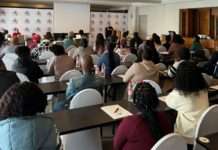Being a content creator in South Africa looking to develop a brand and build a community through YouTube can be as challenging as it is exciting, with a lot of opportunity and reward if you’re willing to put in the time and effort. We spoke to some of South Africa’s most loved YouTubers who are part of the Special Effects Media SA Female Voices Development Program, who share some of the challenges they’ve faced as female content creators in SA, as well as their top tips for anyone looking to take their YouTube game to new heights.
What has been the biggest challenge you have faced as a female content creator in SA and how have you overcome this?
Foyin Ogunrombi: One of the biggest challenges I’ve faced is trying to get people – both brands and the general public alike – to respect the work I do. Because content creation is quite a female dominated field, it’s so easy for people to undervalue it, underestimate us creators and try to delegitimise our work, so I’ve spent a lot of time trying to cultivate a community and culture that understands the hard work we do and I have had to be strict on the brands that I work with, too. It’s important to be paid my worth – on time – and it’s important for female content creators not to compromise on this.
Sim The Lotus: Connecting with other content creators who have the same interests that I have. Being a part of the Female Voices Programme hosted by Special Effects Media SA has helped me overcome this, as I’ve been able to meet female content creators from different walks of life.
Seithati Letsipa: The biggest challenge for me is learning that the client won’t always want to pay for value and the only way to overcome it is to stick to your guns because clients need to understand that it costs to create good quality content.
Tshego Paledi: Once someone hears that you are a content creator, they often have negative connotations about what that entails. Overcoming the perceived idea of who I am or who I am supposed to be is by setting myself apart from the rest.
Miranda Dlamini: My biggest challenge has been consistency and feeling inspired and motivated to create content especially when you’re feeling burned out. I’ve learned to not be too hard on myself and create authentically when I am able to. Also, communicating with my audience when I won’t be able to post content is important in building an honest and transparent relationship.
Ona Oliphant: The biggest challenge I have faced as a female content creator in SA is being taking seriously as an individual and also people taking what I do seriously in terms of those who might not be as well informed.
Your top piece of advice for aspiring female content creators?
Foyin Ogunrombi: Create based on your audience and your skill set – don’t try to emulate other people’s success. Consistency is key – some people argue quality over quantity but the true thing that matters is consistency. Whatever consistency means to you and your schedule, try your best to stick to it!
Sim The Lotus: High-end devices and software don’t inherently mean better content production and outputs. It takes time to learn how to use new devices and new software, so expect delays and understand that it’ll take time to adjust.
Seithati Letsipa: Vision boards don’t work unless you do.
Tshego Paledi: Just start. It might be scary but you never know what could happen unless you take that first step
Miranda Dlamini: Treat your audience as your community and not your fans. Engage with them, interact with their content (if you can) and build an authentic relationship.
Ona Oliphant: Be persistent no matter what may stand in my way and that if it takes less than 2 minutes do it now because procrastination can stand in the way of achieving your goals.
What is the biggest lesson you have learned about building your brand as a YouTuber?
Naledi Malella: Understanding what my analytics mean for me and my channel. Normally I would focus on revenue and would not understand other elements of my analytics and what they mean to my channel. Audience retention, demographics and other factors come into play when trying to better my content.
Tumi Moliko: The biggest lesson I learned was the importance of having support and people with different skills who ultimately want to help you reach your success. For years I put so much pressure on myself to create my brand and as a result I did all of my filming, editing and admin. As much as this was impressive, it was challenging because I was new to the industry and didn’t know much about content creation, working with brands and YouTube in general. Having the support of my partner manager, setting goals for my channel, attending workshops and constantly learning about my craft and its possibilities really changed a lot for me. It really means so much to be supported and taught by the actual platform you create content on. It almost feels like success is inevitable because the tools and tips are offered so generously.
Kay Monqo: The importance of consistency and with trusting that my niche is my biggest advantage as a brand.
Everything Vee: The importance of paying attention to detail.
Zuziwe Gcuku: That you have to put yourself out there and have a clear brand message.
One piece of life advice you wish you could tell your younger self?
Naledi Malella: Remain true to yourself. Your tribe will find you. Remain authentic and that content will speak to those who are just like you.
Tumi Moliko: Be loud and proud about your passions. For many years I hid the fact that I was a YouTuber because of the fear of what the people close to me would think. Looking back now I wish I was more comfortable with sharing my work because it would’ve helped my channel grow and I also would have realised that so many people [far and close] really do support me.
Kay Monqo: Your dreams are never too big, work towards them and there is nothing you cannot achieve.
Everything Vee: I wish I could tell my younger self that mistakes are necessary because they, too, help pave the way to success when we understand the lessons that come from them.
Zuziwe Gcuku: A routine might be boring but it’s necessary, and talent alone is not enough












